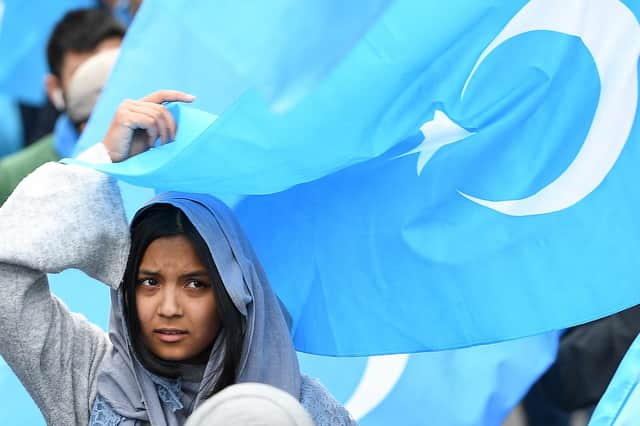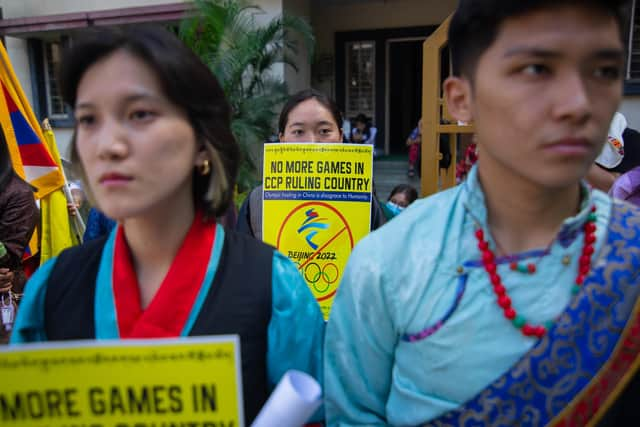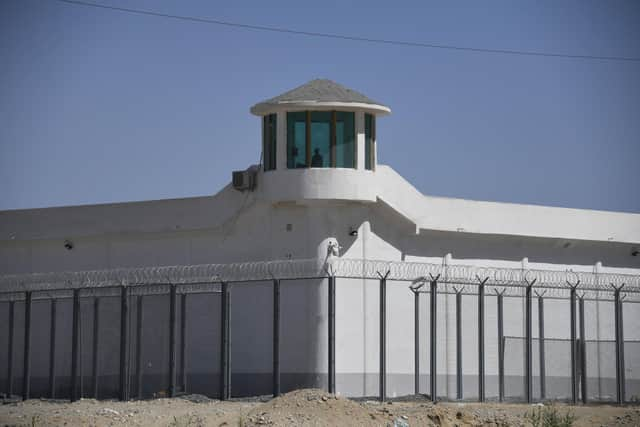On Holocaust Memorial Day, will UK finally stand up to China over Uyghur genocide? – Susan Dalgety
This article contains affiliate links. We may earn a small commission on items purchased through this article, but that does not affect our editorial judgement.


“Why not?” I asked without thinking. “The camps,” she replied. “My grandmother won the lottery of life. For some reason she was put on a boat to America, but her brothers and sisters were all murdered. Except one, my great uncle. He escaped and finally made it to Israel. The rest died.”
The Zoom call went quiet for a moment before we resumed our conversation about my large Scots Irish family with scores of cousins scattered across the UK and Ireland and her much smaller Jewish American family, survivors of the Holocaust.
Advertisement
Hide AdAdvertisement
Hide AdMartha and I are good friends and our conversations can veer from the most serious of topics to the most mundane in a matter of minutes. I can’t remember the details of the rest of our chat but her blunt response to why she has no cousins will remain with me forever.
Martha’s grandmother came from a small town outside Vilnius, the capital of Lithuania. Napoleon dubbed the city the ‘Jerusalem of the North’ and after it was captured by the Nazis in June 1941, the Jewish community was largely annihilated.
The US Holocaust Memorial Museum, like Martha, is matter of fact about the massacre: “By the end of August 1941, most Jews in rural Lithuania had been shot. By November 1941, the Germans also massacred most of the Jews who had been concentrated in ghettos in the larger cities.”
Six million European Jews were murdered during the Holocaust, two-thirds of the population, and on Thursday, on Holocaust Memorial Day, the world will be asked to remember the victims of the Nazi atrocities, as well as those who died in the genocides in Cambodia, Rwanda, Bosnia and Darfur.


Martha’s story was foremost on my mind when I logged on to Glasgow University’s annual Holocaust Memorial Lecture a few days ago. The guest speaker was Dame Stephanie Shirley, a truly remarkable woman who came to the UK in 1938, aged five, one of 10,000 Jewish child refugees in the Kindertransport programme.
In the early 1960s, when Bill Gates and Steve Jobs were but children, Steve, as she is known, working from her kitchen table, founded a software company exclusively for women, called Freelance Programmers. It was later valued at nearly £3 billion.
Speaking in the light of a single candle, which she described as a symbol of light amidst the darkness of life, Dame Shirley told the story of her escape from certain death. “The Nazis created a regime of systemic, bureaucratic, state-sponsored persecution and murder, worse than any the world had seen…” she began, before describing how her parents organised her escape from Vienna to the safety of Sutton Coldfield.
Listening to her from the comfort of my safe European home, it was difficult to properly process the horror she had lived through. But we must never forget, because as Dame Shirley said in her lecture, there is a purpose in ceremonies of remembrance. “Genocides don’t just happen, they only occur when people are afraid to speak out, or worse are indifferent.”


Advertisement
Hide AdAdvertisement
Hide AdThe world looked on with seeming indifference when one million Rwandans were massacred in a few bloody weeks in 1994. President Bill Clinton later apologised for his inaction. "I do feel a lifetime responsibility," he said in 2008, while on a trip to the country, but his impotent words came far, far too late.
Tony Blair’s legacy may be haunted by his decision to invade Iraq, but in 1999 his very vocal pressure on Nato to protect Kosovo from Serbian forces likely saved Europe from another genocide. Speaking later, Blair said he felt Kosovo’s Muslim population was facing “the closest thing to racial genocide that I've seen in Europe since the Second World War.
“I didn't feel that we could simply stand aside from that if we had the means, which we did, to intervene and to stop it.”
Twenty years on, another Muslim community, this time in north-west China, live in fear of their lives. It is believed that one million Uyghurs have been detained in a large network of what China calls "re-education camps", and hundreds of thousands more thrown in prison.
On Thursday, the French Parliament declared China’s treatment of its Uyghur population was genocide. A resolution, proposed by the Socialists, but backed by President Macron’s Republic on the Move party, said the National Assembly “officially recognises the violence perpetrated by the People’s Republic of China against the Uyghurs as constituting crimes against humanity and genocide”.
America has imposed sanctions on China for what it has also described as genocide and declared a diplomatic boycott of the forthcoming Beijing Winter Olympics – a political gesture the UK government was happy to follow.
But Boris Johnson’s government refuses to call out China’s human rights abuses for what they are, despite a vote by Parliament last April declaring the atrocities to be genocide and a recent report by the Foreign Affairs Committee urging the government to speak out.
Privately, it is said the Foreign Secretary Liz Truss believes the treatment of the Uyghurs should be regarded as genocide, but for the moment she is sticking to the Foreign Office line that only a court can decide when human rights abuse becomes genocide.
Advertisement
Hide AdAdvertisement
Hide AdPerhaps on Thursday, while remembering those who died in previous genocides, Liz Truss could find the political courage to stand up for the Uyghurs and name the evil they face for what it is. That, as Tony Blair said in 1999 about Kosovo, would be “simply the right thing to do”.
A message from the Editor:
Thank you for reading this article. We're more reliant on your support than ever as the shift in consumer habits brought about by coronavirus impacts our advertisers.
If you haven't already, please consider supporting our trusted, fact-checked journalism by taking out a digital subscription.
Comments
Want to join the conversation? Please or to comment on this article.
